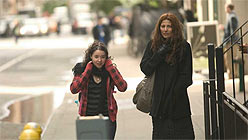Sometimes when I return home from work at night, a gaunt couple haunts the freeway exit ramp with a sign that begs passersby for help. I have never slowed down to give them a single dollar bill. Do I feel guilty when I ignore the destitute? Should I be generous with those less fortunate than myself? In her new movie Please Give, the writer and director Nicole Holofcener skillfully addresses these questions, and the broader idea underlying them: what are the proper limits of altruism?
In another director’s hands, this subject might have been rife with sanctimony. Instead, Holofcener has made a sly, urbane comedy with several smart actresses who make her acerbic dialogue lively and believable, character-driven. In other words, Please Give is the kind of film that Woody Allen used to make. While the milieu is the same as his — a metropolis that is largely white and middle-class — the played out scenarios, of mismatched couples fighting off each other, their neuroses and ennui (see Whatever Works (2009)), are revivified here. You get the feeling that these aren’t just characters in an entertainment. Holofcener has captured real human foibles, the small intimate details that are integral parts of recognizable and, even familiar, personalities.
With her fourth feature film, Holofcener once again summons her muse in the guise of Catherine Keener. At her self-conscious best here, Keener plays Kate, a New York City resident and, along with her husband Alex (the orotund Oliver Platt), co-owner of a used but posh furniture store. Kate’s bleeding liberal heart must be the one pictured on the movie poster: she cannot walk by a street person without handing them money. Abby, her adolescent daughter, is often the shocked and outraged witness to her mother’s unsparing generosity. Why will Kate hand out a twenty-dollar bill to a stranger, but not buy her a new pair of expensive jeans? What else, besides guilt, could be the source of her mother’s behavior?
To begin with, Kate and Alex’s marriage stands at the friendly impasse of middle age, where watching TV together at night substitutes for connection and passion. However, their routine days, governed by the furniture business and the task of raising their sensitive, teenage daughter, are made more interesting (to themselves) as they covet the apartment next door. Once their elderly neighbor Andra dies, they’ll be able to buy it, and expand their cramped living quarters. Even though they’re blissed-out while imagining the new space, Kate feels conflicted: isn’t it contemptible to secretly hope for and be delighted by the idea of Andra’s death simply for her family’s personal gain? And what, exactly, does it mean to be a good neighbor?
Through Andra’s presence next door, we are introduced to her granddaughters, Mary (blithely played by Amanda Peet) and Rebecca (Rebecca Hall). Mary is an aesthetician, who is conversationally blunt, and romantically jaded after a recent break up. Rebecca works as a mammography technician, the caretaker who tends to their elderly grandmother. She is mousy, withdrawn and pathologically self-sacrificing, and I instantly responded to her.


